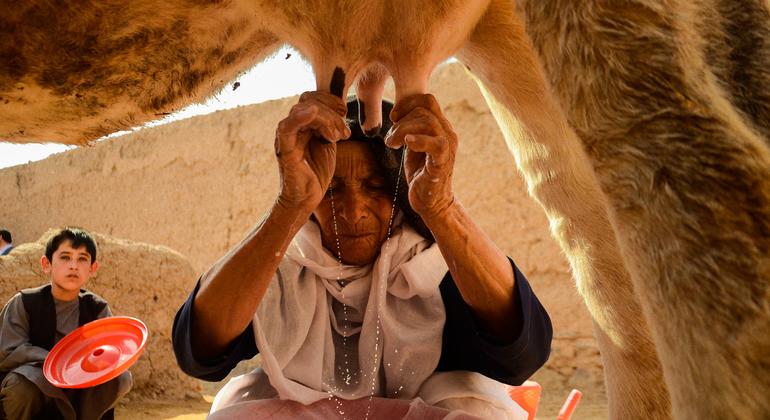This is particularly vital during key life stages such as pregnancy and lactation, childhood, adolescence and older age, says the study, entitled Contribution of terrestrial animal source food to healthy diets for improved nutrition and health outcomes.
Comprehensive analysis
It’s the most comprehensive analysis yet of the benefits and risks of consuming animal source foods and is based on data and evidence from more than 500 scientific papers and some 250 policy documents, said FAO.
A plate of bacon and eggs with a glass of milk on the side, can provide a range of important so-called “macro-nutrients”, such as protein, fats and carbs, and also micro-nutrients that are hard to find in plants, “in the required quality and quantity”, said FAO.
High quality protein, a number of essential fatty-acids – together with iron, calcium, zinc, selenium, Vitamin B12, choline and bioactive compounds like carnitine, creatine, taurine – are provided by foods from farm and other livestock animals, and have important health and developmental functions.

Chickens are a widely held economic and nutritional asset in rural Africa and are frequently managed by women.
Iron and vitamin A are among the most common micronutrient deficiencies around the world, particularly in children and pregnant women, FAO notes.
More than one in two preschool children (some 372 million) and 1.2 billion women of child-bearing age, according to a study published in the Lancet, suffer from the lack of at least one of three micronutrients: iron, vitamin A or zinc.
Three quarters of these children live in South and East Asia, the Pacific and sub-Saharan Africa.
Regional varieties
Not surprisingly, according to the report, consumption of animal-based food from animals varies widely around the world. A person in the Democratic Republic of the Congo (DRC) for example, consumes on average only 160 grammes of milk a year, while your average Montenegro resident, consumes 338 kilogrammes.
Looking at eggs, a person in South Sudan consumes 2g on average a year compared to an average 25kg for a person in Hong Kong. The average person in Burundi consumes just 3kg of meat a year, compared to 136kg for someone living in Hong Kong, said FAO.

Contribution of terrestrial animal source food to caloric supply by region and subregion.
Meat and drink for the SDGs
If consumed as part of an appropriate diet, animal source foods can help with meeting the nutrition targets endorsed by the World Health Assembly and Sustainable Development Goals (SDGs) related to reducing stunting, wasting among children under five, low birthweight, anaemia in women of reproductive age, and obesity and non-communicable diseases (NCDs) in adults, FAO adds.
But at the same time, the livestock sector “must contribute to addressing a range of challenges,” writes FAO Deputy Director-General Maria Helena Semedo and Chief Economist Maximo Torero Cullen in a foreword to the report.
Environmental hazards
“These include issues related to the environment” such as deforestation, CO2 emissions, unsustainable water and land use, pollution, and animal health related issues such as diseases and antimicrobial resistance; and livestock related issues like zoonotic and food-borne disease risks, said the FAO deputy chief.
Red meat alert
The report makes it clear that consumption of even low levels of processed red meat can increase the risk of mortality and chronic disease outcomes, including cardiovascular diseases and colorectal cancer.
However, consuming unprocessed red meat in moderate amounts “may have minimal risk “, said FAO, “but is considered safe with regards to chronic disease outcomes.”
Meanwhile the evidence of any links between milk, eggs and poultry consumption in healthy adults and diseases such as coronary heart disease, strokes and hypertension is inconclusive (for milk) or non-significant (for eggs and poultry), said FAO.

Progress towards World Health Assembly global nutrition targets





